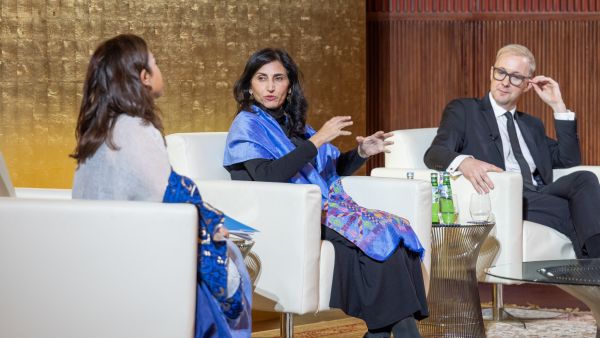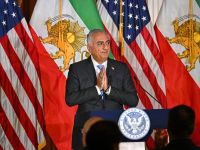Justice Under Scrutiny: GU-Q Event Examines the Shifting Role of Public International Law

Georgetown University in Qatar (GU-Q) recently hosted a public event titled "International Law at a Crossroads? Recent ICJ & ICC Developments and Their Global Impact," featuring a thought-provoking conversation with internationally renowned legal experts Diana Buttu and Dr. Ralph Wilde.
The panel examined recent groundbreaking decisions by the International Court of Justice (ICJ) and the International Criminal Court (ICC) that are reshaping global discourse on state and individual accountability. The discussion also addressed the upcoming ICJ Advisory Opinion on Obligations of States with Respect to Climate Change and governmental obligations concerning the presence and activities of the United Nations, other international organizations, and third states within countries.
The conversation, moderated by Noha Aboueldahab, Assistant Professor of International Law at GU-Q, reflected on the broader implications of these legal developments highlighting how public international law is being tested in addressing contemporary crises.
Diana Buttu, a lawyer specializing in negotiations, international law, and human rights, offered valuable insights into legal accountability in context. Drawing on her experience as a former legal advisor on inter-country peace negotiations, Buttu provided a unique perspective on the intersection of public international law and global diplomacy.
“While the international legal system has gotten better over time, the big problem is the lack of a global sovereign. And so when you don't have a global sovereign, it means that we are left to the devices of what individual states want,” she explained.
Ralph Wilde, a Professor of International Law at University College London (UCL), brought his expertise on public law and extraterritorial human rights to the discussion. His extensive scholarship explores legal accountability and the protection of human rights in the international arena. “The only way to understand international law as Law is in terms of the role of states in ensuring compliance,” he said, adding: “When one state in particular is violating international law, the manifestation of the international community is so important.”
Now celebrating its 20th Anniversary, the event was part of GU-Q’s ongoing commitment to fostering informed dialogue on pressing global issues and advancing academic and public understanding of the evolving role of international law in global concerns.
Background Information
Georgetown University in Qatar
Established in 1789 in Washington, DC, Georgetown University is one of the world’s leading academic and research institutions. Georgetown University in Qatar (GU-Q), founded in 2005 in partnership with Qatar Foundation, seeks to build upon the world-class reputation of the university through education, research, and service. Inspired by the university’s mission of promoting intellectual, ethical, and spiritual understanding, GU-Q aims to advance knowledge and provide students and the community with a holistic educational experience that produces global citizens committed to the service of humankind.
Located in Doha’s Education City, GU-Q offers the same internationally recognized Bachelor of Science in Foreign Service degree as Georgetown’s Capitol Campus in Washington, DC. This unique, interdisciplinary program prepares students to tackle the most important and pressing global issues by helping them develop critical thinking, analytic, and communication skills within an international context. GU-Q alumni work in leading local and international organizations across industries ranging from finance to energy, education, and media. The Qatar campus also serves as a residency and delivery location for the Executive Master’s in Emergency and Disaster Management along with the Executive Master’s in Leadership.





